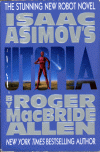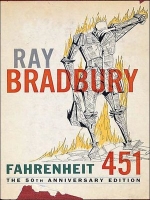I’ve said here many times that Isaac Asimov is my favorite author. It wasn’t until a few years ago that I read “The Last Question,” Asimov’s favorite short story written by himself. Last night I stumbled across a story called “The Last Answer.” At first I thought, “hey, I’ve read this before,” then did a double-take. It was “Answer,” not “Question.” This story focused on the afterlife instead of entropy. They are both good stories, however I agree with Asimov in his opinion that “The Last Question” is better. I highly suggest reading them both, but I’m not sure what order to recommend. I’ll list the links in order of publication, so you decide. Read both stories before looking at the comments on either one, because they are filled with spoilers.
“The Last Question” – Isaac Asimov (1956)
“The Last Answer” – Isaac Asimov (1980)


I remember reading “The Last Question” when I was 9 or 10 years old. I thought it was a GREAT story then and I think it’s a GREAT story now.